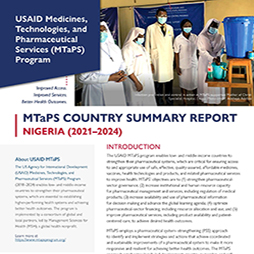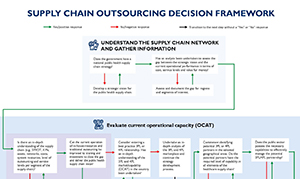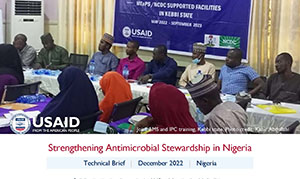Challenges
A World Health Organization (WHO) Joint External Evaluation (JEE) assessment conducted in Nigeria in June 2017 revealed that the country scored 2 (limited capacity) in health care-associated infection prevention and control (IPC) programs, antimicrobial resistance (AMR) detection, and surveillance of infections caused by antimicrobial-resistant pathogens. Despite efforts by the Government of Nigeria, WHO, the Food and Agriculture Organization (FAO), the US Government’s implementing partners,* and others supporting the Federal Ministry of Health (FMOH), most core capacities measured by the JEE still lie in the “limited to developed” range. Furthermore, the assessment indicated that Nigeria has limited capacity for all indicators in AMR, including antimicrobial stewardship (AMS) and IPC. Implementing global recommendations for containing AMR by using the multisectoral approach is still in its infancy.
MTaPS' Support
In line with the 2015 WHO Global Action Plan on AMR and Nigeria’s National Action Plan-AMR, MTaPS Nigeria focuses on supporting the appropriate use of antimicrobials, strengthening IPC practices, and consolidating multisectoral coordination. MTaPS is working to strengthen technical and managerial capacities within the human and animal health systems to contain the emergence and propagation of AMR. The program works closely with the Nigerian Center for Disease Control, which hosts the country’s AMR Technical Working Group (TWG) and Secretariat.
MTaPS Focuses on the Following Technical Areas
Strengthening Multisectoral Coordination on AMR
MTaPS Nigeria supports multisectoral coordination by ensuring effective coordination through regular meetings. The program directly supports the national AMR TWGs and helps develop terms of reference for state and local committees and subcommittee members. MTaPS reinvigorated the animal and environmental sectors, which were previously not active, and incorporated them into the TWGs. MTaPS will scale up AMR activities by selecting health facilities that the program will support to establish and strengthen AMS and IPC committees.
Strengthening IPC Programs
The MTaPS program supported review of seven IPC standard operating procedures (SOPs) and establishment of the AMR TWG Secretariat and training its members. In collaboration with the state Ministries of Health and AMR TWG Secretariat, MTaPS trained health care providers in the supported facilities on the SOPs and supported the facility committees in implementing work plans. The program will scale up interventions in additional facilities, conduct baseline assessment of IPC core components, establish or strengthen facility IPC committees, and develop and implement facility action plans in the new facilities. Lessons learned from the initial set of facilities will be applied in the new facilities.
Establish and Strengthen AMS Programs
In Nigeria, the MTaPS program supported the rapid assessment of AMS policies, regulatory framework, and supply chain management of antimicrobials by using a multisectoral approach. This assessment led to the development of a national AMS plan and legislation that regulates the use, availability, and quality of antimicrobials. MTaPS supported the AMR TWG Secretariat in strengthening the national AMS committees with terms of reference and establishing a state-level AMS committee and facility committees at Enugu State University Teaching Hospital Parklane, Enugu Ezike General Hospital, and Agbani General Hospital in Enugu state. The program will continue to work with key stakeholders in FMOH, WHO, and AMR TWG Secretariat to review the essential medicines list and clinical guidelines that promote appropriate use while monitoring current antimicrobial use and consumption. MTaPS will support the review and dissemination of the national stewardship and clinical guidelines that include AWaRe classification and implement AMS programs to improve antibiotic use at designated health facilities.
*Implementing Partners
Breakthrough Action
Data for Impact
FAO
Global Health Supply Chain-Procurement and Supply Management Program
Integrated Health Program
Promoting the Quality of Medicines Plus (PQM+) Program
World Bank’s Regional Disease Surveillance System Enhancement
WHO
World Organisation for Animal Health (OIE)
United Nations Environment Programme (UNEP)
UNICEF





